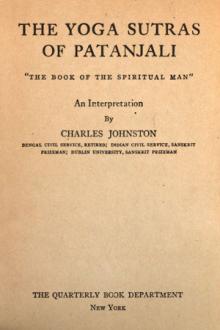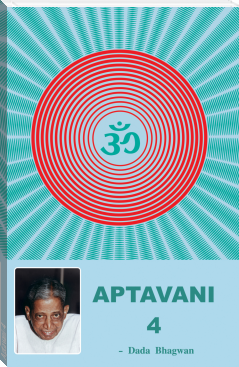The Yoga Sutras of Patanjali by Patañjali (color ebook reader .txt) 📖

- Author: Patañjali
- Performer: -
Book online «The Yoga Sutras of Patanjali by Patañjali (color ebook reader .txt) 📖». Author Patañjali
The condition is, briefly, that of the awakened spiritual man, who sees and hears beyond the veil.
44. Mastery of the elements comes from perfectly concentrated Meditation on their five forms: the gross, the elemental, the subtle, the inherent, the purposive. These five forms are analogous to those recognized by modern physics: solid, liquid, gaseous, radiant and ionic. When the piercing vision of the awakened spiritual man is directed to the forms of matter, from within, as it were, from behind the scenes, then perfect mastery over the “beggarly elements” is attained. This is, perhaps, equivalent to the injunction: “Inquire of the earth, the air, and the water, of the secrets they hold for you. The development of your inner senses will enable you to do this.”
45. Thereupon will come the manifestation of the atomic and other powers, which are the endowment of the body, together with its unassailable force.
The body in question is, of course, the etheric body of the spiritual man. He is said to possess eight powers: the atomic, the power of assimilating himself with the nature of the atom, which will, perhaps, involve the power to disintegrate material forms; the power of levitation; the power of limitless extension; the power of boundless reach, so that, as the commentator says, “he can touch the moon with the tip of his finger”; the power to accomplish his will; the power of gravitation, the correlative of levitation; the power of command; the power of creative will. These are the endowments of the spiritual man. Further, the spiritual body is unassailable. Fire burns it not, water wets it not, the sword cleaves it not, dry winds parch it not. And, it is said, the spiritual man can impart something of this quality and temper to his bodily vesture.
46. Shapeliness, beauty, force, the temper of the diamond: these are the endowments of that body.
The spiritual man is shapely, beautiful strong, firm as the diamond. Therefore it is written: “These things saith the Son of God, who hath his eyes like unto a flame of fire, and his feet are like fine brass: He that overcometh and keepeth my works unto the end, to him will I give power over the nations: and he shall rule them with a rod of iron; and I will give him the morning star.”
47. Mastery over the powers of perception and action comes through perfectly concentrated Meditation on their fivefold forms; namely, their power to grasp their distinctive nature, the element of self-consciousness in them, their inherence, and their purposiveness.
Take, for example, sight. This possesses, first, the power to grasp, apprehend, perceive; second, it has its distinctive form of perception; that is, visual perception; third, it always carries with its operations self-consciousness, the thought: “I perceive”; fourth sight has the power of extension through the whole field of vision, even to the utmost star; fifth, it is used for the purposes of the Seer. So with the other senses. Perfectly concentrated Meditation on each sense, a viewing it from behind and within, as is possible for the spiritual man, brings a mastery of the scope and true character of each sense, and of the world on which they report collectively.
48. Thence comes the power swift as thought, independent of instruments, and the mastery over matter.
We are further enumerating the endowments of the spiritual man. Among these is the power to traverse space with the swiftness of thought, so that whatever place the spiritual man thinks of, to that he goes, in that place he already is. Thought has now become his means of locomotion. He is, therefore, independent of instruments, and can bring his force to bear directly, wherever he wills.
49. When the spiritual man is perfectly disentangled from the psychic body, he attains to mastery over all things and to a knowledge of all.
The spiritual man is enmeshed in the web of the emotions; desire, fear, ambition, passion; and impeded by the mental forms of separateness and materialism. When these meshes are sundered, these obstacles completely overcome, then the spiritual man stands forth in his own wide world, strong, mighty, wise. He uses divine powers, with a divine scope and energy, working together with divine Companions. To such a one it is said: “Thou art now a disciple, able to stand, able to hear, able to see, able to speak, thou hast conquered desire and attained to self-knowledge, thou hast seen thy soul in its bloom and recognized it, and heard the voice of the silence.”
50. By absence of all self-indulgence at this point, when the seeds of bondage to sorrow are destroyed, pure spiritual being is attained.
The seeking of indulgence for the personal self, whether through passion or ambition, sows the seed of future sorrow. For this self indulgence of the personality is a double sin against the real; a sin against the cleanness of life, and a sin against the universal being, which permits no exclusive particular good, since, in the real, all spiritual possessions are held in common. This twofold sin brings its reacting punishment, its confining bondage to sorrow. But ceasing from self-indulgence brings purity, liberation, spiritual life.
51. There should be complete overcoming of allurement or pride in the invitations of the different realms of life, lest attachment to things evil arise once more.
The commentator tells us that disciples, seekers for union, are of four degrees: first, those who are entering the path; second, those who are in the realm of allurements; third, those who have won the victory over matter and the senses; fourth, those who stand firm in pure spiritual life. To the second, especially, the caution in the text is addressed. More modern teachers would express the same truth by a warning against the delusions and fascinations of the psychic realm, which open around the disciple, as he breaks through into the unseen worlds. These are the dangers of the anteroom. Safety lies in passing on swiftly into the inner chamber. “Him that overcometh will I make a pillar in the temple of my God, and he shall go no more out.”
52. From perfectly concentrated Meditation on the divisions of time and their succession comes that wisdom which is born of discernment.
The Upanishads say of the liberated that “he has passed beyond the triad of time”; he no longer sees life as projected into past, present and future, since these are forms of the mind; but beholds all things spread out in the quiet light of the Eternal. This would seem to be the same thought, and to point to that clear-eyed spiritual perception which is above time; that wisdom born of the unveiling of Time’s delusion. Then shall the disciple live neither in the present nor the future, but in the Eternal.
53. Hence comes discernment between things which are of like nature, not distinguished by difference of kind, character or position. Here, as also in the preceding Sutra, we are close to the doctrine that distinctions of order, time and space are creations of the mind; the threefold prism through which the real object appears to us distorted and refracted. When the prism is withdrawn, the object returns to its primal unity, no longer distinguishable by the mind, yet clearly knowable by that high power of spiritual discernment, of illumination, which is above the mind.
54. The wisdom which is born of discernment is starlike; it discerns all things, and all conditions of things, it discerns without succession: simultaneously.
That wisdom, that intuitive, divining power is starlike, says the commentator, because it shines with its own light, because it rises on high, and illumines all things. Nought is hid from it, whether things past, things present, or things to come; for it is beyond the threefold form of time, so that all things are spread before it together, in the single light of the divine. This power has been beautifully described by Columba: “Some there are, though very few, to whom Divine grace has granted this: that they can clearly and most distinctly see, at one and the same moment, as though under one ray of the sun, even the entire circuit of the whole world with its surroundings of ocean and sky, the inmost part of their mind being marvellously enlarged.”
55. When the vesture and the spiritual man are alike pure, then perfect spiritual life is attained.
The vesture, says the commentator, must first be washed pure of all stains of passion and darkness, and the seeds of future sorrow must be burned up utterly. Then, both the vesture and the wearer of the vesture being alike pure, the spiritual man enters into perfect spiritual life.
The third book of the Sutras has fairly completed the history of the birth and growth of the spiritual man, and the enumeration of his powers; at least so far as concerns that first epoch in his immortal life, which immediately succeeds, and supersedes, the life of the natural man.
In the fourth book, we are to consider what one might call the mechanism of salvation, the ideally simple working of cosmic law which brings the spiritual man to birth, growth, and fulness of power, and prepares him for the splendid, toilsome further stages of his great journey home.
The Sutras are here brief to obscurity; only a few words, for example, are given to the great triune mystery and illusion of Time; a phrase or two indicates the sweep of some universal law. Yet it is hoped that, by keeping our eyes fixed on the spiritual man, remembering that he is the hero of the story, and that all that is written concerns him and his adventures, we may be able to find our way through this thicket of tangled words, and keep in our hands the clue to the mystery.
The last part of the last book needs little introduction. In a sense, it is the most important part of the whole treatise, since it unmasks the nature of the personality, that psychical “mind,” which is the wakeful enemy of all who seek to tread the path. Even now, we can hear it whispering the doubt whether that can be a good path, which thus sets “mind” at defiance.
If this, then, be the most vital and fundamental part of the teaching, should it not stand at the very beginning? It may seem so at first; but had it stood there, we should not have comprehended it. For he who would know the doctrine must lead the life, doing the will of his Father which is in Heaven.
1. Psychic and spiritual powers may be inborn, or they may be gained by the use of drugs, or by incantations, or by fervour, or by Meditation.
Spiritual powers have been enumerated and described in the preceding sections. They are the normal powers of the spiritual man, the antetype, the divine edition, of the powers of the natural man. Through these powers, the spiritual man stands, sees, hears, speaks, in the spiritual world, as the physical man stands, sees, hears, speaks in the natural world.
There is a counterfeit presentment of the spiritual man, in the world of dreams, a shadow lord of shadows, who has his own dreamy powers of vision, of hearing, of movement; he has left the natural without reaching the spiritual. He has set forth from the shore, but has not gained the further verge of the river. He is borne along by





Comments (0)